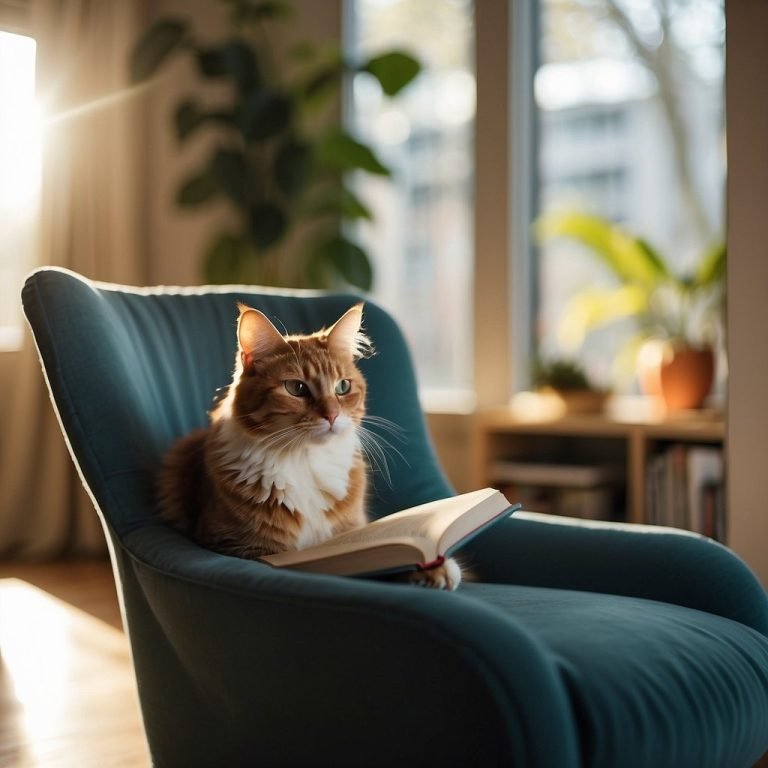The Surprising Benefits of Cat Ownership for Mental Health: Paws for Thought 🐾

Embracing the company of a feline friend might be more beneficial to your mental health than you’ve ever imagined.
Cats, with their soothing purrs and affectionate headbutts, often become much more than pets; they can be silent therapists and confidants.
It’s been suggested that the mere act of stroking your cat’s fur can lower blood pressure and reduce the symptoms of anxiety. 🐱

Your furry companion does much more than lay around basking in sunbeams or playfully pouncing on unseen prey.
Engaging in daily care routines, such as feeding and grooming, gives you a sense of responsibility and structure.
It can boost self-esteem and even help fend off feelings of loneliness by providing a sense of purpose.
Plus, who can resist the comfort of a cat curled up in your lap after a long day? 🐾
Research confirms that cat ownership can carry considerable mental health benefits.
The rhythmic act of petting a cat has a calming effect, which is beneficial for your overall mental well-being.
Despite the age-old debates about ‘cat people’ versus ‘dog people’, cats unequivocally earn their stripes as capable companions in fostering mental health resilience.
And, while the scientific community continues to explore the intricate link between cat ownership and mental health, there’s no denying the warm, fuzzy feeling that fills your heart when greeted with a contented meow at the door.
The Science of Companionship
Cats offer more than just purrs and cuddles; they can have a profound impact on your mental health through science-backed means like boosting oxytocin levels and providing unwavering companionship.
Bonding with Your Feline Friend
When you stroke your cat’s soft fur or engage in playful games, your body responds by releasing oxytocin, sometimes referred to as the “love hormone.” 😺 This powerful neurotransmitter strengthens the bond between you and your kitty, reducing feelings of stress and anxiety.
It’s a bit like nature’s own stress relief potion, with your cat as the charming purveyor!
- Oxytocin release: Petting a cat can increase oxytocin levels, leading to a sense of calm and trust.
- Social interaction: Your cat’s presence can fulfill social needs, helping you feel less isolated.
Cats and Psychological Well-Being
Cats are not just passive recipients of affection; they actively contribute to your psychological well-being.
By their very presence, cats can help temper negative emotions and enhance feelings of joy and contentment. 🐾 They are quiet companions who provide significant emotional support without any expectation—except perhaps an occasional treat or chin scratch.
- Stress reduction: The soothing sound of a cat’s purr or the ritual of daily care can lower stress levels.
- Sense of purpose: Caring for a cat can give you a sense of responsibility and routine that bolsters your well-being.
Your cat isn’t just a furry friend; they’re a whiskered wellness warrior, silently championing the cause of your mental health!
Health Benefits of Owning a Cat
Owning a cat has its perks, especially when it comes to your mental health.
Let’s look at how your feline friend can help keep you purring with a sound mind and a happy heart. 😺
Stress Reduction Through Purrs and Petting
The simple act of petting your cat can significantly decrease your stress levels.
With every stroke, you’re not just pampering your kitty; you’re also releasing the feel-good hormones in your body.
The act of petting leads to the production of serotonin, a natural stress-reliever.
Moreover, the sound of a cat’s purring is associated with relaxation and peace, creating a therapeutic harmony that can help soothe your nerves.
Cats and Lowered Risk for Heart Diseases
Studies have indicated that cat owners may enjoy a lowered risk of heart attack and other cardiovascular problems.
This could be because your cuddly companion has a knack for lowering your blood pressure just by being around.
Cats provide a calming presence that, over time, may contribute to better physical health by mitigating the risk factors associated with heart diseases.
So next time your cat curls up in your lap, remember that they’re not just seeking warmth but also enhancing your well-being with every purr. 🐾
Understanding Cat-Owner Dynamics
Imagine starting and ending your day with a soft purr and the contented weight of your feline friend curled up by your side. Owning a cat creates a unique bond that not only brings immediate joy but also contributes positively to your mental health.
Let’s explore the dynamic between you and your cat, especially how daily interactions and caregiving can enhance your well-being.
The Impact of Daily Cat Interactions
Your daily interactions with your cat provide much more than just cute moments.
When your kitty greets you with a gentle headbutt, they’re not just saying hello—they’re showing trust and affection, giving you a feeling of unconditional love. 🐾 Each playtime session is not just about fun; it acts as a de-stressor that can lift your mood, thanks to the laughs and excitement.
These moments with your cat can foster a strong emotional connection that often brightens your day.
- Sense of Purpose: Feeding and caring for your cat provides a daily routine that instills a sense of responsibility and purpose in your life.
- Bonding: Playing or simply cuddling offers comforting physical contact that can ease anxiety and create a feeling of safety and trust.
Providing Care for Improved Self-Care
Taking care of your cat does wonders for your mental health, often reflecting back on your self-care routines.
Every time you feed your cat or clean their litter box, you’re not just maintaining their health, but you’re also subconsciously reinforcing the importance of self-care in your own life.
- Routine: Establishing a care schedule for your cat ensures both yours and your cat’s needs are met on a regular basis.
- Empathy: As you become more attuned to your cat’s needs, you may find that your capacity for empathy and understanding grows.
Nurturing your kitty can also cultivate a cat lover‘s community, connecting you with like-minded individuals who share your passion for pets.
Finding common ground over cat care can lead to new friendships and support systems.
So, while the little furball is chasing lasers, you’re engaging in a lifestyle that’s enriching in the most purr-fect of ways! 🐱💕
Mental Health and Therapeutic Effects
Exploring the role of cats in your mental well-being unveils a treasure trove of benefits.
Let’s look at how these furry friends offer emotional support and what science says about their impact on various mental health conditions.
Pets as Emotional Support
You’ve likely felt the immediate joy of a cat’s purr or the comfort of their soft fur.
Cats, inherently skilled at sensing your mood, serve as a source of comfort and support. Therapy animals, especially cats, are known to help reduce feelings of loneliness and depression.
Imagine coming home to a feline friend whose mere presence can make the worries of your day dissipate. 😺
Findings from Scientific Research
Scientific research is shedding light on the more nuanced ways cats can influence mental health.
A study highlights a potential connection between cat ownership and schizophrenia, where factors like Toxoplasma gondii exposure play a role.
Yet despite this, cat ownership has plenty of positives to offer.
The astounding 67% of cat owners mention their pets give them a reason to get up in the morning—showing that these creatures have profound effects on your daily mental state.
Reducing stress levels, improving cardiovascular health, and alleviating symptoms of anxiety and depression are just a few scientifically backed benefits that cats bring into your life. 🐾
Risks and Safety in Cat Ownership

While cats can offer companionship and joy, it’s important that you are aware of certain risks associated with cat ownership and know how to manage them to ensure both your and your cat’s well-being. 🐾
Debunking Myths About Toxoplasma Gondii
Toxoplasma gondii, a protozoan commonly seen in cats, can potentially cause toxoplasmosis in humans.
However, it’s a myth that simply owning a cat exposes you to a high risk.
In fact, T. gondii is more often contracted from handling raw meat or gardening in contaminated soil than from your furry friend. Always wash your hands thoroughly after these activities to minimize risk.
If your cat stays indoors and doesn’t hunt, the likelihood of it contracting T. gondii dramatically decreases.
Practicing Safe Handling and Hygiene
Maintaining hand hygiene is a key part of safe cat ownership.
Here’s what you can do:
- After handling your cat, especially if they’re outdoor hunters, ensure you wash your hands thoroughly with soap and water.
- Prevent your cat from accessing potentially contaminated substances by keeping trash sealed and outdoor areas clean.
By staying informed and practicing these simple safety tips, you’ll be able to enjoy the pawsome benefits of cat companionship without undue worry.
Stay safe and have fun with your feline pal! 😺






